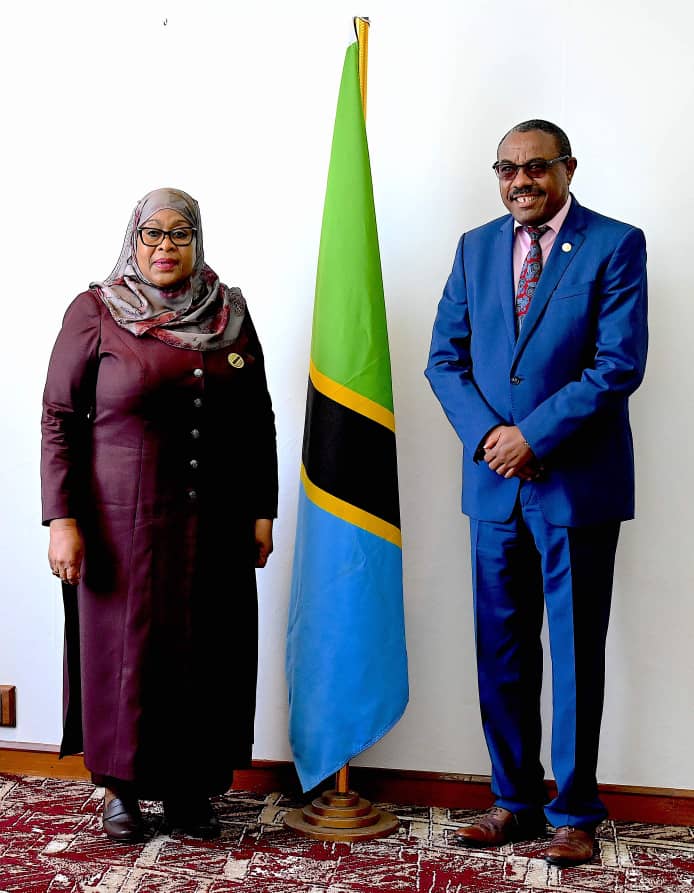
In an interview in Dar es Salaam, AGRA Chairman Hailemariam Dessalegn discusses the pivotal role of agriculture in Tanzania’s economy, underscoring its contribution of nearly 30% to the GDP and its support for three-quarters of the national workforce. He elaborates on the Tanzanian government’s dynamic strategies to enhance agricultural productivity, AGRA’s impactful contributions to advancing this sector, and the critical role of both international and local partnerships in propelling sustainable agricultural growth. Dessalegn emphasizes the integration of these efforts with global climate initiatives, highlighting the need for cohesive action to address the challenges posed by climate change. As a member of President Samia Suluhu Hassan’s Presidential Food and Agriculture Delivery Council, chaired by former Prime Minister Mizengo Pinda, Dessalegn underscores the concerted efforts of prominent leaders to advance Tanzania’s agricultural sector, enhance food security, and foster economic resilience.
Q: Could you delineate the significance of agriculture to Tanzania’s economy and its people?
A: Hailemariam Dessalegn: Agriculture is not merely a sector of our economy; it’s the backbone, accounting for nearly 30 percent of Tanzania’s GDP and employing three-quarters of our workforce. This sector is indispensable, ensuring economic stability and sustaining the livelihoods of millions of Tanzanians. Beyond its economic contributions, agriculture plays a vital role in maintaining social cohesion and reducing poverty. Under President Samia Suluhu Hassan’s leadership, there’s a strong emphasis on enhancing this sector to ensure it continues to be a cornerstone of our economic and social fabric, with a focus on innovation, sustainability, and inclusive growth.
Q: What measures has the Tanzanian government taken to foster agricultural growth?
A: Hailemariam Dessalegn: The government has adopted proactive measures to escalate productivity and fortify food security. Policies such as the Agricultural Sector Development Program II (ASDP II) are meticulously crafted to elevate farmers’ socio-economic conditions. These policies are designed to promote sustainable agricultural practices, increase access to quality inputs, and improve market linkages for farmers. Additionally, the government is investing in infrastructure, research, and extension services to modernize agriculture, making it more resilient and productive. Such strategic investments are critical to ensuring that the agricultural sector remains competitive and capable of meeting both local and international demands.
Q: How does AGRA align its strategies to support Tanzania’s agricultural goals?
A: Hailemariam Dessalegn: AGRA’s strategic vision, as outlined in our 2023-2027 strategy, is to bolster the agricultural framework in Tanzania by enhancing input supply chains, strengthening policy frameworks, building state capabilities, and improving seed systems. Our targeted efforts are designed to impact three million farmers across the nation, focusing on vital crops like maize, sorghum, and sunflower. We are committed to promoting a sustainable transformation across the agricultural landscape, which includes fostering innovation, scaling up best practices, and enhancing farmers’ access to markets and finance. By working closely with the government and other stakeholders, AGRA aims to create a more robust and resilient agricultural sector that can thrive in a changing climate and global market environment.
Q: What role does the Food Systems Partner Dialogue play in Tanzania’s agricultural strategy?
A: Hailemariam Dessalegn: This dialogue serves as a fundamental platform for synchronizing national efforts with global benchmarks in food systems transformation. It’s a confluence where key stakeholders, including government bodies, private sector entities, research institutions, and civil society, align their strategies with the national goals set by the government of Tanzania. The dialogue particularly focuses on climate action, sustainable agriculture, and nutritional security, ensuring that our strategies are well-rounded and capable of addressing the multifaceted challenges facing the sector. This collaborative approach is essential for developing innovative solutions and achieving sustainable development goals related to agriculture.
Q: How do you anticipate the outcomes of the Food Systems Partner Dialogue influencing the upcoming Africa Food Systems Forum 2024?
A: Hailemariam Dessalegn: The insights garnered from this dialogue will critically shape our contributions to the Africa Food Systems Forum (AFSF) 2024 in Kigali. This forum represents a strategic venue to bridge our national priorities with broader continental and global agendas. It will enable Tanzania to showcase its innovative approaches to food systems transformation and highlight the unique challenges and opportunities faced by our agricultural sector. By fostering robust collaborations, we aim to generate tangible results that can be replicated across the continent, thus advancing the collective goal of achieving food security and sustainable agriculture in Africa.
Q: As Tanzania prepares for significant global platforms like COP 29 and AFSF 2024, what visions do you hold for the country’s agricultural future?
A: Hailemariam Dessalegn: My vision encompasses Tanzania emerging as a frontrunner in demonstrating how agricultural systems can integrate seamlessly with climate action. We envision a future where sustainable agricultural practices are not only preserving our environment but also enhancing our economic viability. These international platforms, like COP 29 and AFSF 2024, provide pivotal opportunities for us to exhibit our commitments to sustainable development and to secure support from global partners. Through these engagements, Tanzania can position itself as a leader in climate-smart agriculture and contribute to global efforts to mitigate the impacts of climate change on food security.
Q: How crucial are partnerships in realizing sustainable and inclusive agricultural growth in Tanzania?
A: Hailemariam Dessalegn: Partnerships are the cornerstone of our agricultural strategy. They bring together diverse stakeholders, including governments, NGOs, the private sector, and farmers, in a unified effort to exchange knowledge, resources, and technology. Such dynamic collaborations are essential for catalyzing transformative and sustainable growth in Tanzania’s agricultural sector. They ensure that the sector remains a bulwark for our nation’s economy and a beacon of innovation and sustainability on the global stage. By leveraging these partnerships, we can amplify our impact, drive inclusive growth, and ensure that our agricultural systems are resilient and capable of meeting future challenges.
